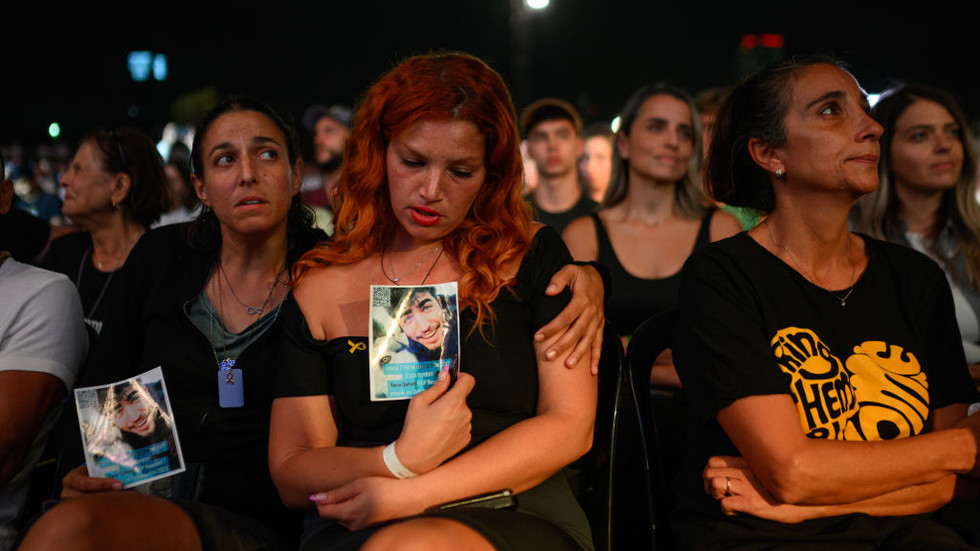On the first anniversary of Hamas’ surprise attack on Israel on October 7, 2022, Prime Minister Benjamin Netanyahu delivered a message centered around national unity and resilience. He emphasized how the attack had awakened Israel’s “inner strength” and reiterated the necessity of continuing the fight against perceived threats to the country’s existence. In a pre-recorded speech aired during memorial ceremonies held across Israel, Netanyahu articulated a vision of solidarity among the citizens aimed at defending their homeland, highlighting the heavy toll that the ongoing conflict has taken, including the deaths of Israeli soldiers and a staggering number of Palestinian casualties. He inferred that historical patterns demonstrate how Israel has emerged stronger from past difficulties, framing the current situation as no different, and underscoring a relentless commitment to confront any threats to national security.
Contrasting with Netanyahu’s narrative of unity, families of victims from the October 7 attack expressed frustration and anger over perceived governmental failures in its aftermath. An unofficial memorial ceremony in Tel Aviv served as the platform for these grieving families to vocalize their discontent. Yonatan Shamriz, who tragically lost his brother during a failed hostage rescue operation, pointedly criticized the government for its lack of preparedness, recalling that October 7 felt like a day when citizens were left to fend for themselves in the absence of a functional military response. This sentiment has resonated with many other Israelis, who have pointed toward missed intelligence warnings from Egyptian officials about Hamas’s intentions, indicating systemic failures in the leadership and operational readiness of the Israeli Defense Forces (IDF).
The sense of betrayal felt by the families stemmed not only from the attack itself but from a perceived lack of accountability from their leaders. Shamriz lamented the ongoing state of alert in Israel and called for an independent inquiry into what he characterized as a colossal failure by the Israeli government. Over the past year, family members of hostages taken by Hamas have consistently advocated for negotiations aimed at securing their release, feeling that the government’s priority has instead been a commitment to an endless cycle of warfare. At a protest in Jerusalem on the anniversary, individuals like Yael Or openly criticized Netanyahu, asserting that his political ambitions have taken precedence over the fates of the hostages, some of whom remain missing and presumed to be in grave danger in Gaza.
Amidst the memorials and the calls for accountability, the striking juxtaposition of Netanyahu’s confident address with the grief and anger of the families highlighted a broader societal rift in Israel. While the Prime Minister focused on notions of inner strength and steadfastness, many families were calling for a recognition of the human cost of the conflict and a clear response to the critical failures that led to the loss of their loved ones. Their anger revealed a deep-seated demand for answers, not only concerning their personal losses but also regarding the strategic and tactical ceilings that they believe contributed to the disaster. Statements from families underscored a feeling that the state was neglecting its duty to protect its citizens adequately, demanding transparency and redress for such missteps.
The lengthy and ongoing humanitarian crisis, particularly concerning the Palestinian population, illustrated the multifaceted nature of the conflict. Over the past year, the toll of the hostilities has escalated dramatically, with over 42,000 Palestinian lives claimed along with the loss of numerous Israeli soldiers. These statistics not only reflect the human devastation inflicted by the conflict but also serve as a somber reminder of the dire need for sustainable resolutions around both grievances and hostilities. The families’ calls, exemplifying a humanistic push for accountability, resonate deeply within a larger national narrative that must grapple with the implications of war in both its immediate and long-term effects.
In summary, the disparity between the government’s stance and the sentiments of the bereaved families encapsulates a critical moment in Israel’s ongoing struggle with national identity, accountability, and security. As Netanyahu urges unity and strength in the face of adversity, many citizens are haunted by the painful losses they’ve experienced and are demanding not only recognition of their grief but also concrete actions that may prevent future tragedies. The differences in responses and perspectives among Israelis highlight the challenging path forward for a nation wrestling with complex layers of conflict, memory, and the quest for peace amid an environment charged with grief and anger. Ultimately, this anniversary marks not just a remembrance of lost lives but also a crucial juncture for Israel to reflect on its past and contemplate its future.

